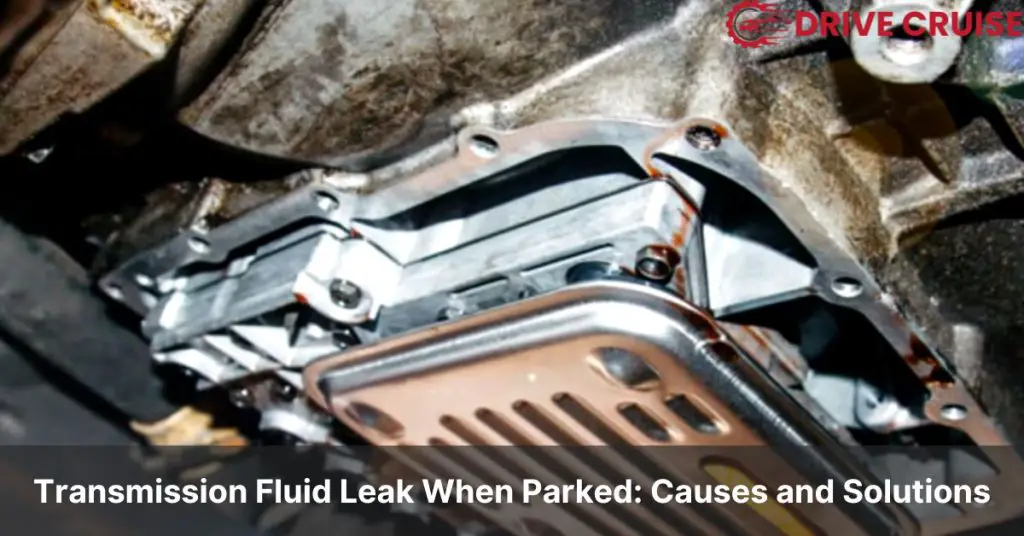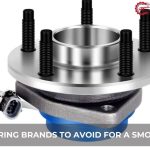If you’ve noticed a reddish fluid leaking from your parked car, especially if it’s concentrated around the middle or rear of the vehicle, you may have a transmission fluid leak. Transmission fluid is typically reddish in color and has a distinct, slightly burnt odor. It’s important to address this issue promptly to avoid further damage to your vehicle’s transmission system.
There are a few potential reasons why you may be leaking transmission fluid. A damaged pan or faulty drain plug can cause leaks, as can a damaged gasket or seal. Broken lines or a malfunctioning torque converter can also be culprits. Proper diagnosis is needed to determine the root cause of the leak and make the necessary repairs.
It’s important to note that driving with a transmission leak can cause serious damage to your vehicle’s transmission system. If you suspect that you have a transmission fluid leak, it’s best to have it inspected by a qualified mechanic as soon as possible.
Potential Culprits Behind the Leak
If you’ve noticed a transmission fluid leak when parked, there are a few potential culprits to consider. Here are some of the most common causes of transmission fluid leaks and how to identify them.
Worn Transmission Pan Gasket
The transmission pan gasket is located at the bottom of the transmission housing and can deteriorate over time due to heat cycles and wear. A leak here allows transmission fluid to drip out when the car is parked. If you suspect a worn transmission pan gasket, check for fluid accumulation on the ground under the vehicle or on the transmission pan itself.
Faulty Transmission Seals
Numerous seals throughout the transmission housing can develop cracks or become brittle, allowing transmission fluid to leak. These leaks might not be readily apparent while driving, but can show themselves when the car is stationary, and fluid pressure is not as high. If you suspect a faulty transmission seal, check for fluid accumulation on the ground under the vehicle, on the transmission housing, or on the transmission dipstick.
Cracked Transmission Housing
In rare cases, a severe impact or collision can cause a crack in the transmission housing itself, leading to a leak. This is typically accompanied by other symptoms like unusual noises or difficulty shifting gears. If you suspect a cracked transmission housing, check for fluid accumulation on the ground under the vehicle or on the transmission housing itself.
Loose or Damaged Fluid Lines
The lines connecting the transmission to the cooler can become loose or develop cracks due to vibration or wear. Leaks at these connection points can manifest when the car is parked. If you suspect loose or damaged fluid lines, check for fluid accumulation on the ground under the vehicle or on the lines themselves.
Overfilled Transmission
An overfilled transmission can cause fluid to leak from the dipstick tube or breather vent in some cases. This can happen due to adding too much fluid during a refill or neglecting to check the fluid level on a hot engine. Refer to the owner’s manual for the proper checking procedure. If you suspect an overfilled transmission, check the fluid level and look for fluid accumulation on the ground under the vehicle.
Why You Shouldn’t Ignore a Transmission Fluid Leak
Transmission Fluid is Vital
Your car’s transmission fluid is essential to the proper functioning of your vehicle. It acts as the lifeblood of the transmission, providing lubrication, cooling, and transmitting power between the engine and wheels. Without transmission fluid, your car’s transmission will not function correctly, and your vehicle will not move.
Leak Worsens Over Time
If you notice that your transmission is leaking, it is crucial to address the issue as soon as possible. A small leak will gradually worsen if left unaddressed. This can lead to a significant loss of fluid, causing internal components to overheat, wear excessively, and eventually lead to transmission failure.
Costly Repairs Down the Road
Ignoring a transmission fluid leak can lead to costly repairs down the road. Addressing a transmission fluid leak early is considerably cheaper than repairing or replacing a damaged transmission due to neglect. If you notice that your transmission is leaking, it is essential to take your car to a reputable mechanic to diagnose and repair the issue.
Diagnosing and Repairing the Transmission Fluid Leak
If you suspect that your car is leaking transmission fluid when parked, it is essential to diagnose and repair the issue promptly. Here are some steps you can take to diagnose and repair the problem.
Importance of Professional Diagnosis
It is crucial to seek a qualified mechanic with experience in transmission repair to diagnose the source of the leak. A professional mechanic will likely perform a visual inspection and potentially utilize specialized tools for a precise diagnosis. Attempting to diagnose and repair the issue yourself can lead to further damage to your car, potentially resulting in more expensive repairs.
Repair Options Based on the Cause
Repairs can vary depending on the identified issue. If the issue is a worn gasket or faulty seal, it might be a relatively straightforward fix. Addressing a cracked housing or damaged lines could involve more extensive work. In rare cases, a complete transmission rebuild or replacement might be necessary.
If you are experiencing transmission front seal leak symptoms, such as transmission fluid leaking from the front of the car, it is crucial to have a professional diagnose and repair the issue. Attempting to fix an automatic transmission fluid leak or transmission seal leak repair yourself could lead to further damage to your car.
When it comes to how to fix automatic transmission fluid leak or how to fix transmission oil leak, it is best to leave it to the professionals. They have the knowledge and experience to diagnose and repair the issue correctly. If you are experiencing a leaking transmission fluid fix, don’t hesitate to seek professional help.
Preventing Transmission Fluid Leaks: Maintenance Matters
Regular Transmission Fluid Service
One of the most important things you can do to prevent transmission fluid leaks is to follow the manufacturer’s recommended service intervals for fluid changes and flushes. This helps to remove contaminants from the fluid and maintain the integrity of the seals. It’s important to use the correct type of fluid as well, as using the wrong type can cause damage to the transmission and seals.
Visual Inspections
Regular visual inspections of the underside of your car can help you catch transmission fluid leaks early. During routine maintenance checks like oil changes or tire rotations, take a quick look at the ground beneath your car to check for any fluid leaks. If you notice any leaks, have them inspected by a professional mechanic as soon as possible to prevent further damage.
Avoiding Excessive Towing or Hauling Heavy Loads
Putting excessive strain on the transmission through heavy towing or overloading the vehicle can contribute to leaks by stressing components and seals. Be sure to check your vehicle’s towing and payload capacities before hauling heavy loads, and avoid exceeding these limits. If you do need to tow or haul heavy loads, make sure to take breaks and allow the transmission to cool down periodically.
Conclusion: Park with Peace of Mind: Addressing Transmission Fluid Leaks
If you suspect that your vehicle has a transmission fluid leak, it’s important to address it promptly. A transmission fluid leak can lead to serious damage to your vehicle’s transmission if left unchecked. Some common signs of a transmission fluid leak include a puddle of fluid under your vehicle, difficulty shifting gears, and a burning smell coming from your engine.
To prevent further damage, it’s important to have your vehicle inspected by a professional as soon as possible. A professional mechanic can diagnose the source of the leak and recommend the appropriate repair. Attempting to fix the leak yourself can be dangerous and may lead to further damage to your vehicle.
Preventative maintenance practices can also help keep your transmission healthy and leak-free. Regularly checking your transmission fluid levels and changing your fluid at the recommended intervals can help prevent leaks from occurring. Additionally, replacing worn seals and gaskets can help prevent small leaks from turning into larger ones.
In conclusion, addressing a transmission fluid leak promptly is crucial to prevent further damage to your vehicle’s transmission. Trusting a professional mechanic to diagnose and repair the issue is the best course of action. By practicing preventative maintenance, you can help keep your transmission healthy and enjoy a smooth driving experience.
Related Posts:
- BF Goodrich HD Terrain T/A KO2 Review: The Ultimate Off-Road Tire?
- C121C Torque Request Signal Denied: What It Means and How to Fix It
- ASC System Service Required: What It Means and How to Fix It
- Honda VSA Solenoid Valve Malfunction: Causes and Solutions
- Sailun Tires Review: Affordable and Reliable Tires for Any Vehicle
- Takeuchi Warning Lights Symbols: A Guide to Understanding Them
- Transmission Fluid Leak When Parked: Causes and Solutions













